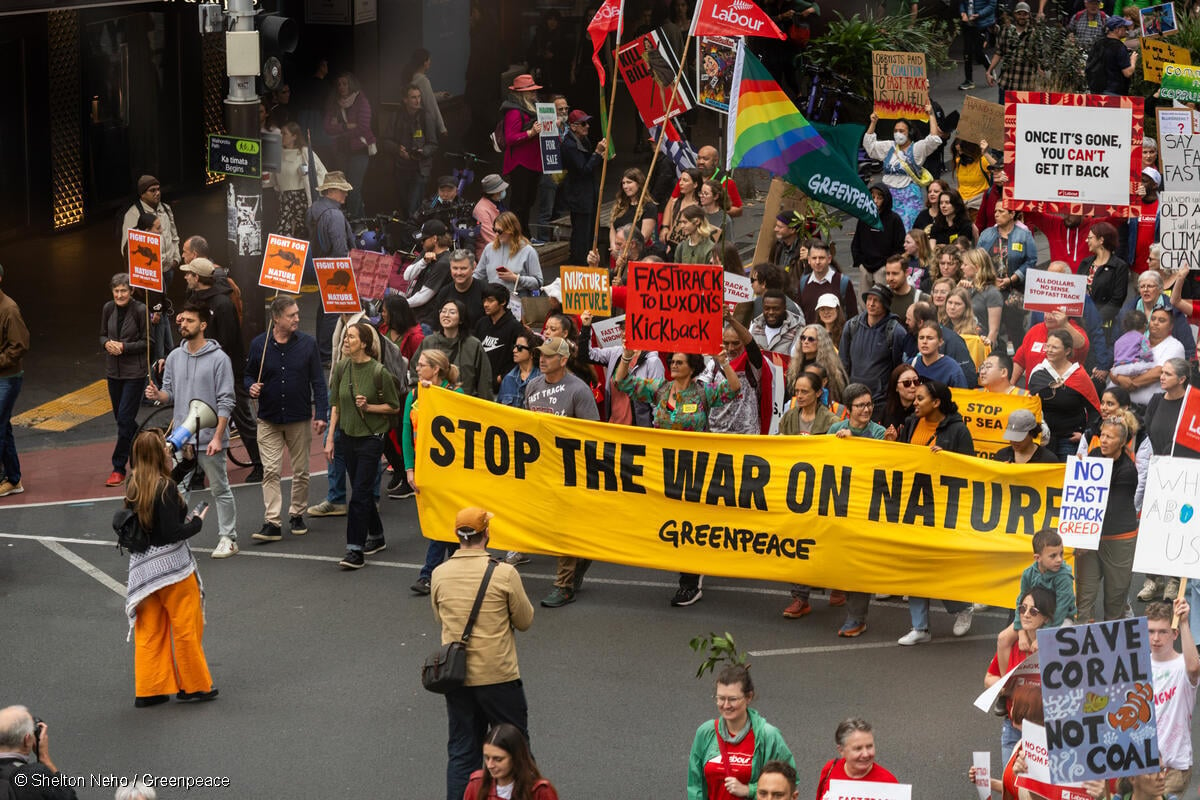Te Whānau o Te Moananui o Toi Te Huatahi is a new trust formed of Kelly Klink and Pita Rikys. The trust’s mission is to right some historic wrongs. Here founder Kelly Klink explains their vision for the future of ocean protection in Aotearoa, and what they’re up against to achieve it.
The situation we’re in isn’t anything new – in fact, it’s unfortunately the same old story – Māori fighting to protect their inherent right to safeguard their tupuna moana from abuse.
Colonisation ushered in a new way of living that was foreign to the tangata whenua, and initiated the shackling of our own mātauranga of protecting the moana.
For centuries, Māori lived intimately within our environment as caretakers and guardians; our people of Aotea (Great Barrier Island) were known to freely move with the seasons to collect kai.
With the centuries-old theft of our land by settlers, many Māori have since been restricted to living on small reservations; no longer able to gather kai from traditional fishing grounds according to the seasons.
And now our moana is suffering. Many marine species have been decimated by overfishing, the dumping of toxic sludge, or the introduction of non-indigenous species – all of which have culminated in the devastatingly diminished fish stocks we are seeing today.
This system was created in an unsustainable, greedy way, enabling some people and organisations to take as much as they can from the sea now, with no thought for future generations. What about our mokopuna – our children and grandchildren who are yet to come? What sort of world – earth and ocean – are we leaving for them?
Commercial fishing methods, dredging and dumping of sludge, and trawling the ocean floor have had a ruinous impact on habitats and other marine life.
The lack – and sometimes complete absence – of Māori at key decision-making tables continues to be a major issue; this was all too visible at Auckland Council’s recent hearing for the Ports of Auckland. Moreover, the inability by Auckland Council to translate their report into te reo Māori – an official language of Aotearoa – further highlights the disregard they hold toward their obligation to Te Tiriti o Waitangi.
It is now time for all Māori to come together and fight the political policies that exclude our rights in the protection of our moana.
In 2019, we took on the challenge to file an appeal in the High Court to stop the EPA (Environmental Protection Authority) granting CRL (Coastal Resources Limited) a 250,000m3 consent application to dump toxic dredged sludge just 12 miles out from Aotea.
Part of Justice Cull’s decision determined that CRL chose to ignore the Māori decision-making committee – meaning they did not have to listen or give effect to Te Tiriti o Waitangi. Once again, we saw the blatant ignoring of Māori voices and the disheartening inaction of Te Tiriti o Waitangi.
You can also review the attached report from the Hauraki Gulf Forum detailing their inaction on this crucial issue.
We continue to see various reports written but little or zero action being taken to stop the desecration of the moana. The continued use of Māori kupu in Pakeha organisations with no consultation with Māori is ignorant and insulting, frustrating and unacceptable in the year 2020.
Pita Rikys (Tāmaki Makaurau) states, “The origins of this whānau / roopu originate from decades of frustration and impotence felt by Māori from having to work within dysfunctional, managed and confined innately racist systems, such as local government, justice (particularly in the courts and the Resource Management Act); and to a lesser degree even the Waitangi Tribunal and statutory iwi provisions.
“In concert, these organisations and systems have consistently failed to acknowledge, protect and restore the Mauri (essential energy and life force) of important Māori cultural, historical, spiritual and natural constructs or systems in Te Ao Māori, both as a whole, and in regard to the individual elements ( e.g animals, creatures, plants ) and their habitats within them.”
The establishment of this roopu is intended to be a vehicle and resource base to trigger a wide range of initiatives and actions aimed at giving effect to the kaupapa, both by the trust alone and in collaboration with others.
Rikys futher adds, “The goal is to pursue and be committed to the restoration of Tino Rangatiratanga under Te Tiriti o Waitangi as primary sovereign and constitutional authority.”
We, the Trust, seek:
To create a relationship-based whakapapa collective roopu, voice and vehicle to achieve the kaupapa by all or any means that are or may become available.
To act proactively, reactively and as a priority wherever possible, to hold local and central government responsible for their actions and inactions, by legal process or any other means.
Our tupuna:
According to Ngāti Rehua Ngāti Wai ki Aotea traditions, Toi te Huatahi arrived around the twelfth century from Hawaiiki, and from this visit arose many traditional place names on Aotea. The great sea of Aotea is known as Te Moananui o Toi te Huatahi (the Great Sea of Toi). The many islands within this sea are known collectively as Nga Poito o te Kupenga o Toi te Huatahi (floats of the fishing net of Toi te Huatahi). The traditional name for “The Needles”, which are located off the northern part of Aotea, is Nga Taratara o Toi (Spines of Toi). Papakuri, a small rocky outcrop just off from Rangiahua (Flat Island), also carries the tradition of Toi’s visit, as does Hauturu o Toi, known today as Little Barrier Island.
How can others support this vision?
We invite all contributions from Māori to our valuable and necessary work on behalf of the tangata whenua o Aotearoa. Please contact us for more detailed information – [email protected]. Also visit:
Maori fishing rights explained.
Erosion of Māori fishing rights.
Kelly Klink is a founding member of Te Whānau o Te Moananui o Toi Te Huatahi.




